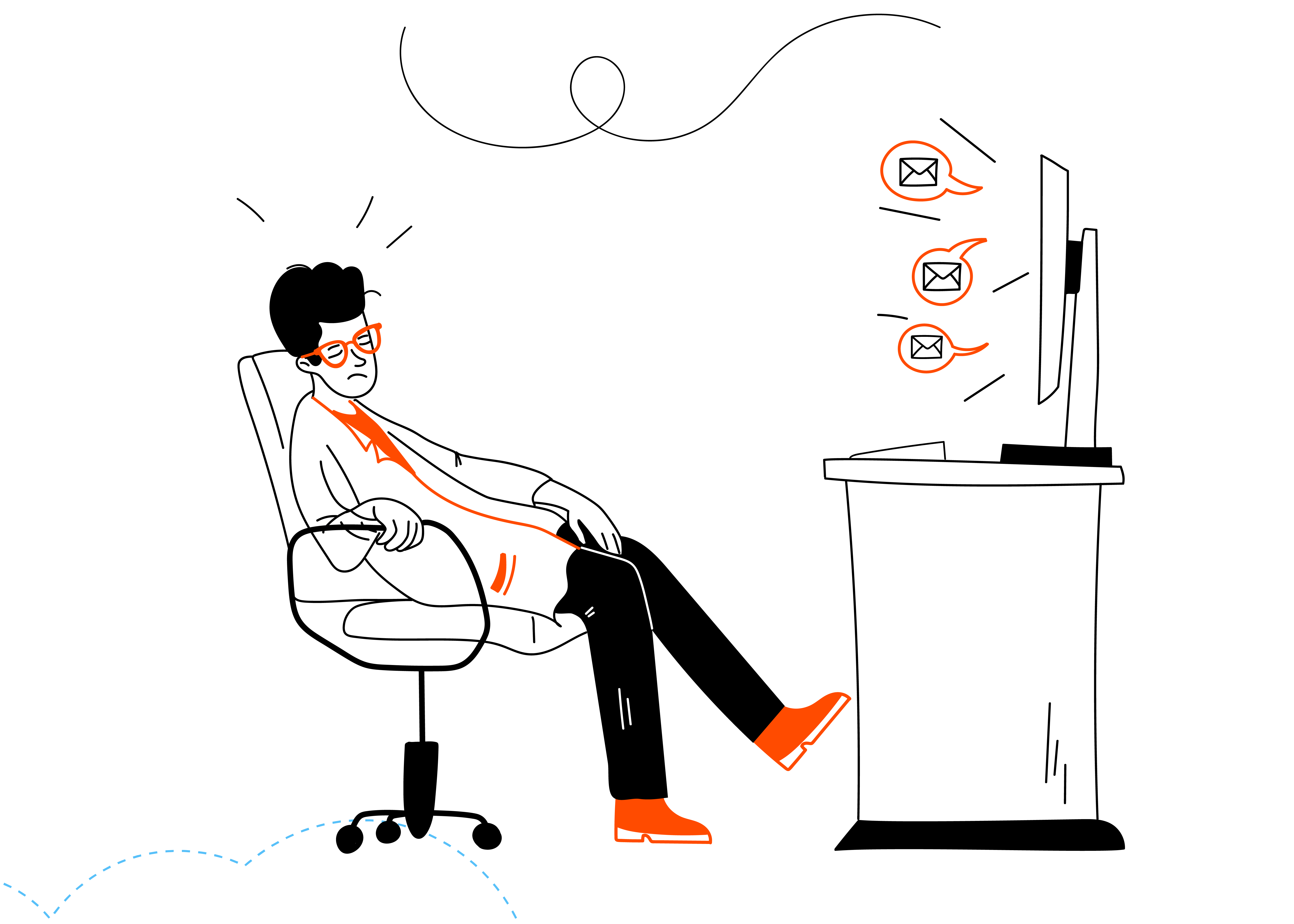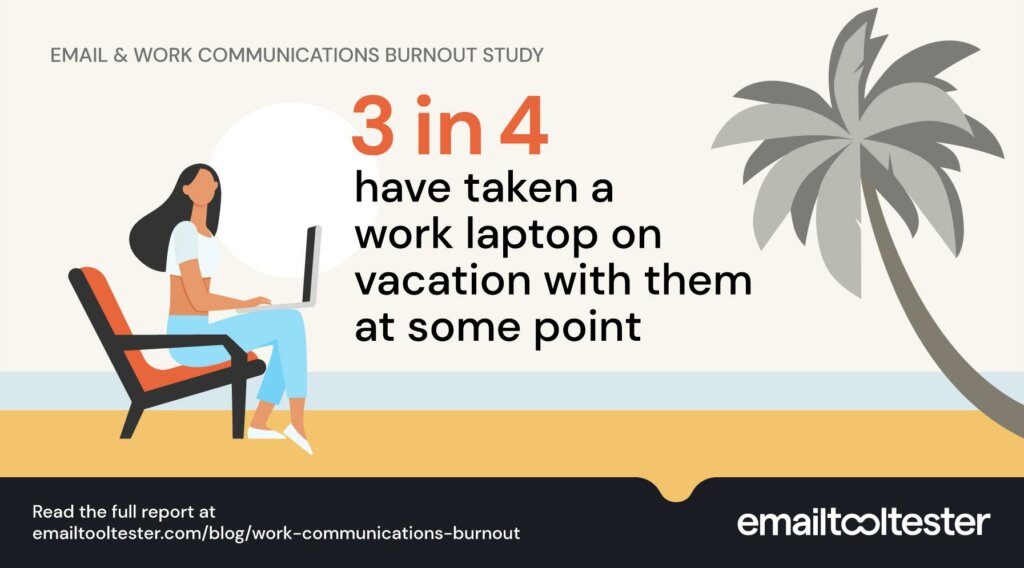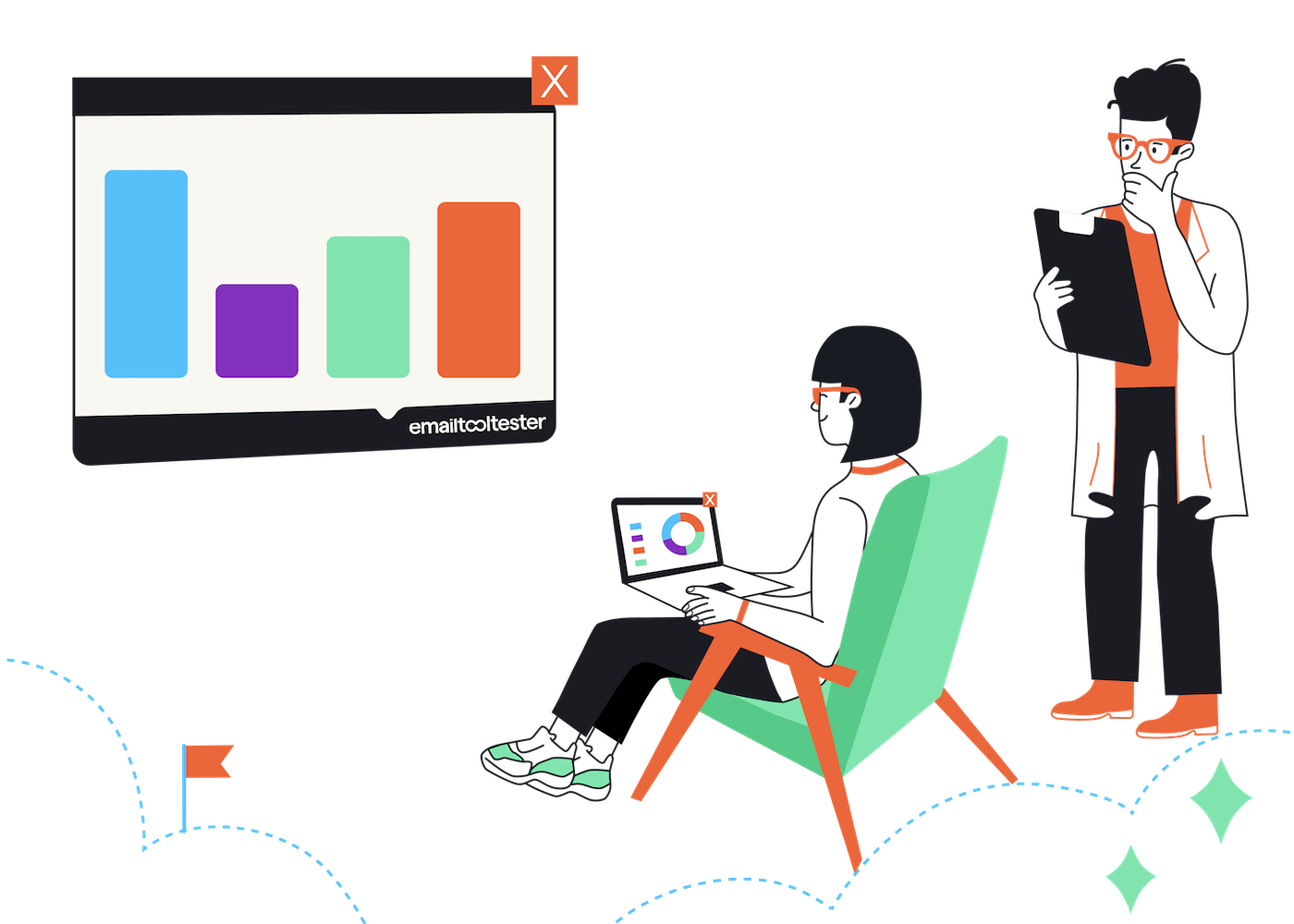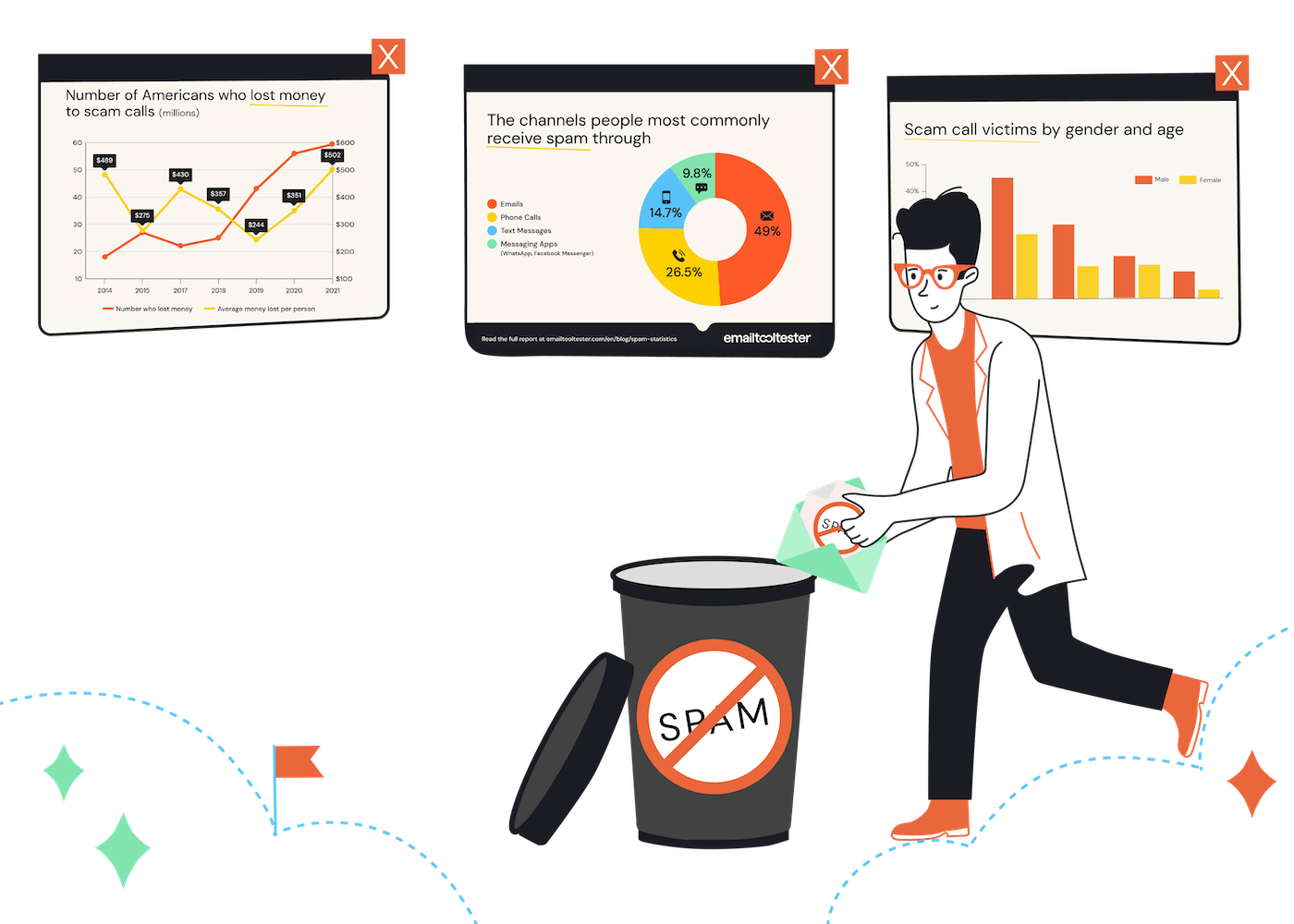Despite being invented in the early 70s, it wasn’t until the 1990s that emails became a mainstay of corporate America. Today, it’s not just emails the average American worker can expect to wade through on a daily basis – but a whole host of digital communication platforms, like Zoom, Slack, and Google Workspace.
During COVID-19, many companies had to become wholly dependent on digital communication to survive. But what is the lasting legacy of this shift towards digital communication? How much time does the average American spend on email admin per day, and how burnt out are we from digital comms?
To find out, we surveyed 1,125 American adults about digital communication at work (via emails and other platforms) to find out how emails and work messages affect their mental health and private lives.
Key findings:
- Four in five (78.7%) of respondents have dreaded opening their work email inbox, with 58.5% admitting that they experience this negative emotion regularly
- The average person spends two hours and 45 minutes on digital work communications every day
- Most people (65.1%) have gotten into trouble over a significant email mistake
- The average person thinks only 41.7% of work emails are relevant to them
- Three-quarters of respondents (77%) say that more time is spent communicating digitally about a problem than you would need in real life.
- Three-quarters (74%) also said they would rather work remotely and have more digital communication than resolve things quicker in real life.
- Three in four (73.6%) communicate with loved ones less because they are burned out by work communication
- Seven in ten (71.1%) feel expected to respond to emails out of hours
- Nearly all respondents (90.4%) thought a right-to-disconnect law would be beneficial
The average person spends two hours and 45 minutes on digital work communications every day
Taking an average of all respondents who use emails at work, the average person receives 32 emails per day. On the two ends of the spectrum, one in ten people receive (14.3%) upwards of 50 emails a day at work, and two in ten people receive less than 10 emails a day (17.3%).
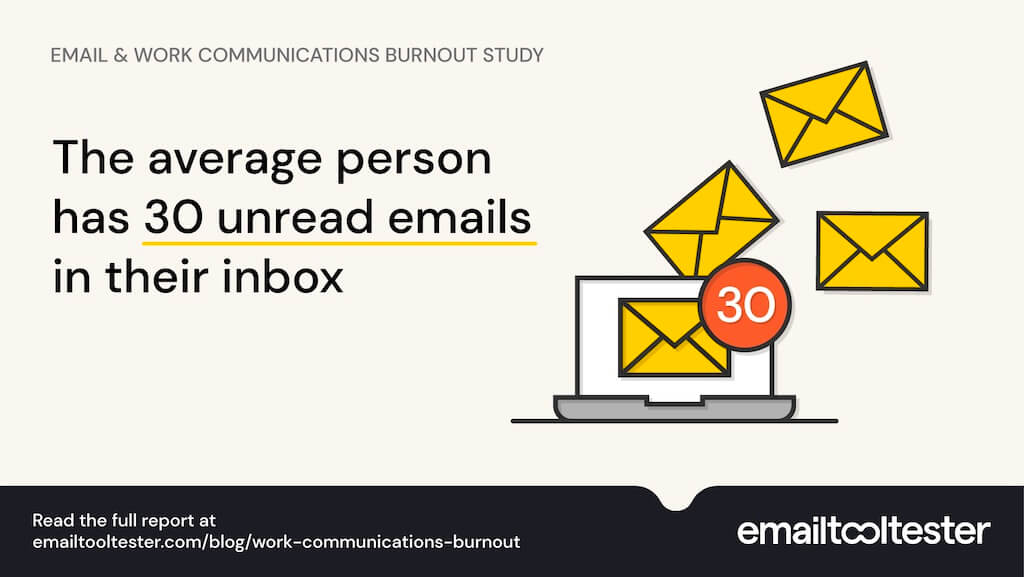
When we asked people to estimate how many unread emails they had in their work inbox, the average answer was 30 – with 12% admitting to having more than 50 unaddressed emails.
Considering that the average respondent also said they had 41 unread personal emails, the average person has 71 unread emails looming in their personal and work inboxes.
But increasingly, emails aren’t the only digital communication tool used by employees. When asked how long they spend per day communicating across all digital platforms (like Slack or Teams) the average answer was two hours and 45 minutes.
Although this was the mean average response, half (51.9%) of respondents spent three hours or more per day digitally communicating with colleagues, with one in ten people (12.7%) spending five hours or more on digital work comms every day.
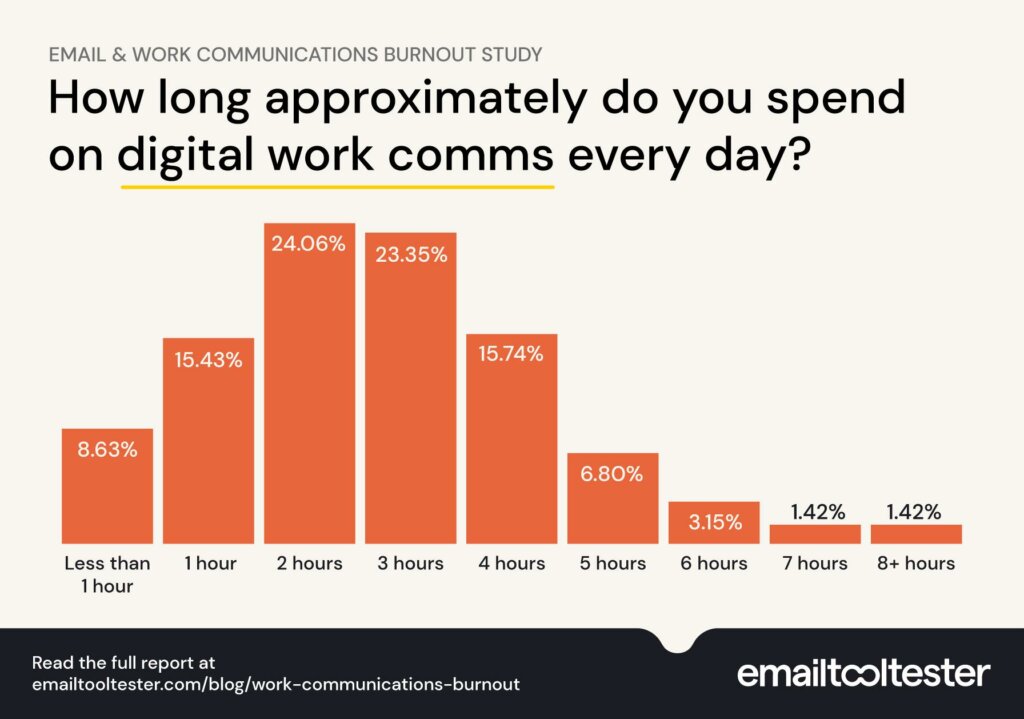
Four in five (78.7%) of respondents have dreaded opening their work email inbox
When we asked whether people have dreaded opening their email inbox at work, nearly all – 78.7% – said that they had. A majority, 58.5% of all respondents, said that they regularly dread opening up their email inboxes.
It was unsurprising then that a similar amount (80.8%) have felt anxious about email correspondence at work – and more than half of people regularly feel anxious (58.3%) about email correspondence at work. Outcomes of this anxiety include triple-checking emails, and three-quarters (76.2%) say that their anxiety is compounded by the struggle to read someone's tone via email or work message software.
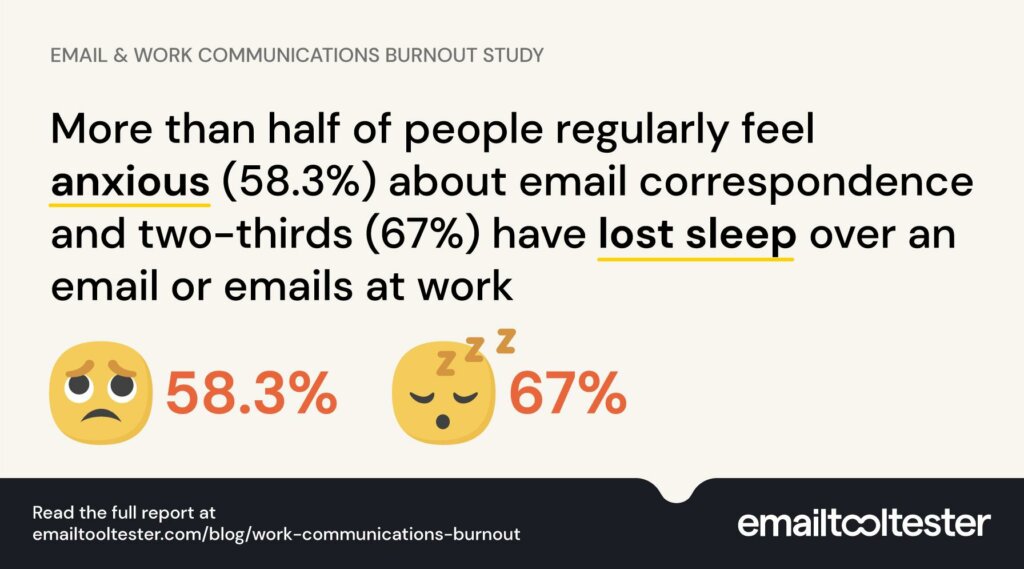
And this anxiety doesn’t just affect the work day. Two-thirds of people (67%) admitted to losing sleep over an email or emails at work. There was a clear correlation with your seniority and sleep loss over email comms: 63.2% of entry-level employees had lost sleep over an email, rising to eight in ten (81.1%) of business owners and CEOs.
Most people (65.1%) have gotten into trouble over a significant email mistake
The survey found that most people feel pressured to respond to emails quickly. Three in five regularly felt the need to respond quickly (59.2%) and just under a quarter (23.3%) sometimes felt the pressure to respond quickly. But is this affecting the quality of people’s communication?
According to the study, making email mistakes is normal – with most people making at least one email faux-pas a few times a week or more (68.9%). In fact, more than a quarter of people (27.6%) are making an email mistake at least once a day.
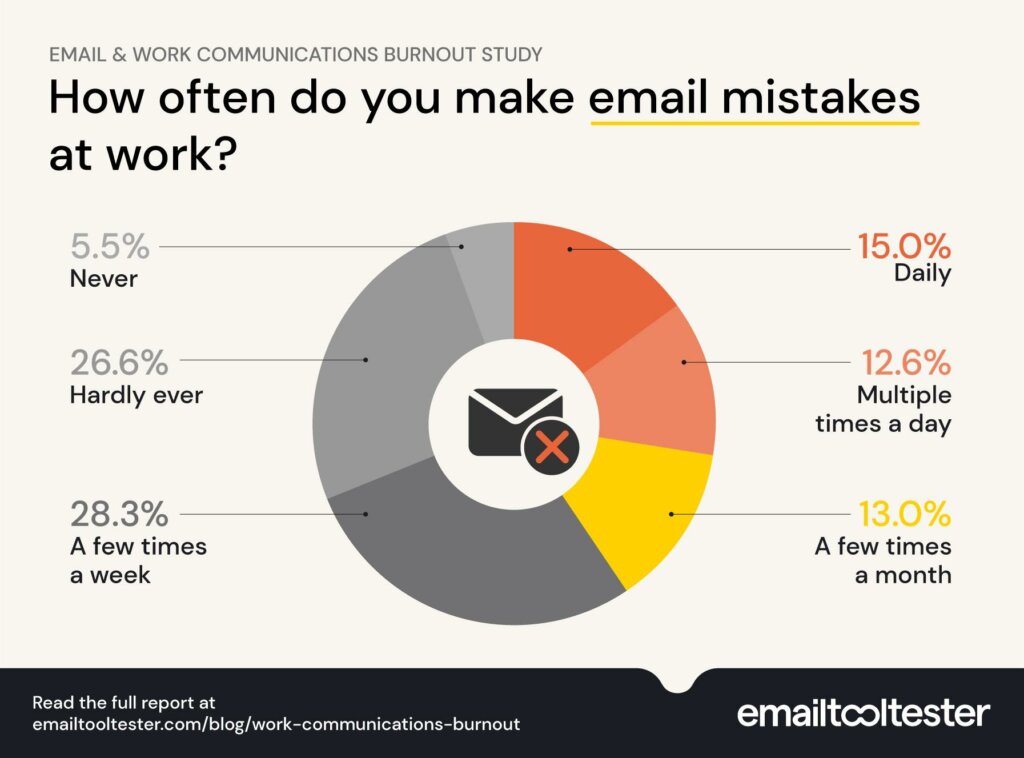
It’s no surprise then that most respondents (65.1%) had gotten into trouble at work over a significant email mistake.
But what causes people to make email mistakes so frequently? Email organization has a lot to do with it. Three-quarters (73.3%) missed an important work email because it got lost in their inbox and another three-quarters of respondents missed an important email because it went to spam (74.9%). In fact, 62.6% said that being overwhelmed by emails caused them to make mistakes.
The average person thinks only 41.7% of work emails are relevant to them
But is a great proportion of this email stress unwarranted? And what chunk of the two and half hours on email admin is wasted? When asked what percentage of work emails people believed were relevant to them, the average response was 41.7%. However, a third of people (33.2%) believed that more than half of their work inbox was irrelevant to them.
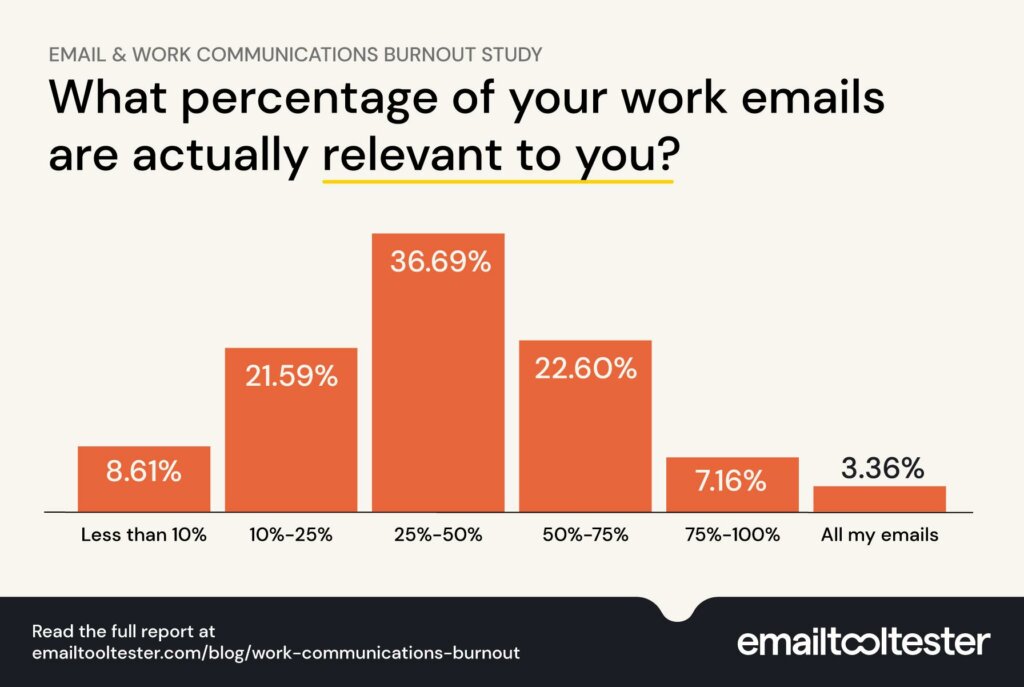
And it’s not just email communication that people think is wasting their time. Three-quarters (77%) say that more time is spent communicating digitally about a problem (taking into account all platforms, like Zoom and Slack) than you would need to in real life.
Because of this, most people (62.3%) said that they preferred working when their colleagues are offline because there is less communication.
Does this mean that people are keen to get back into the office and waste less time on unnecessary digital communication or deciphering people’s tones? Definitively no. Despite digital miscommunication, 74% said they would rather work remotely and have more digital communication than resolve things quicker in real life.
Three in four (73.6%) communicate with loved ones less because they are burned out by work comms
It’s not just our working lives that are filled with digital communication, catching up with friends and family remotely via phone or messages and responding to private emails also requires daily effort.
On average, respondents said they spent around two and a half hours at work on email admin and when asked how long they spend virtually communicating with friends and family, it was about the same – meaning that at least five hours of each day is spent communicating remotely with others.
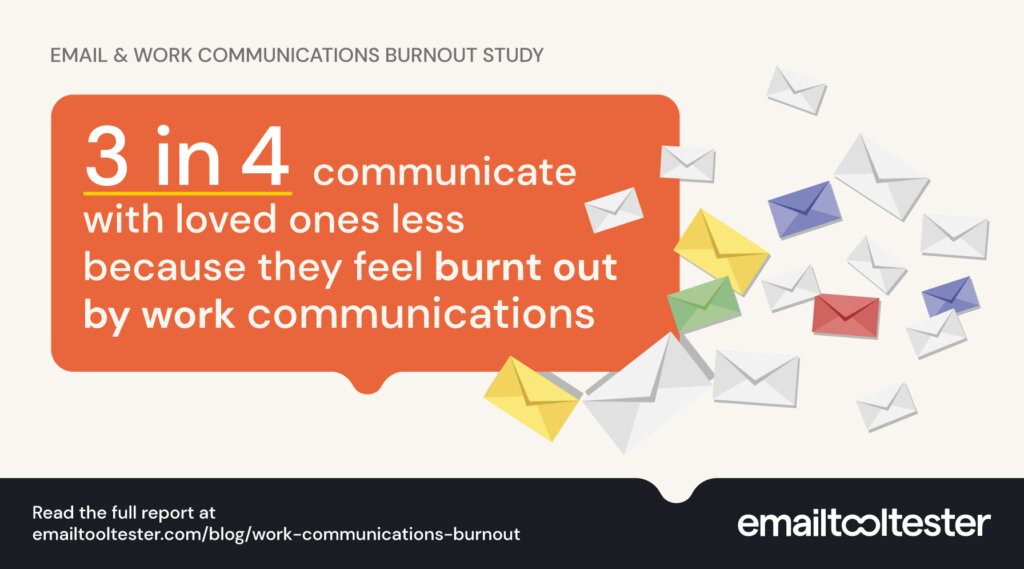
Unfortunately, though, three in four (73.6%) said that they communicate with loved ones less because they feel burnt out by communicating with colleagues and clients at work. And with many people failing to keep up with all their work emails and messages, it’s not surprising that half of people then also feel overwhelmed by the number of personal messages they receive (49.1%).
Seven in ten (71.1%) feel expected to respond to emails out of hours
This study found that stress around work comms is causing two-thirds of people to lose sleep, and is impacting three in four people’s social lives, but how else is email anxiety creeping into life outside of office hours?
Many of us have our mobile phones in our pocket or nearby at all times. Rather than shutting down their laptop at the end of the day and being done with work, eight in ten people (81.4%) said they had access to their work emails or work communication platforms on their phones too. One reason for this could be the high percentage of people (71.1%) who believe their boss expects them to respond to emails after hours.
Not only do people feel expected to answer emails outside of hours, but three-quarters of people also (75.8%) believe that you get ahead by responding to emails outside of hours. Either out of a feeling of necessity or ambition, three in four (74.5%) have taken a work laptop with them on vacation, and most people admitted to answering work emails whilst on vacation (74.3%) with just over half (54.3%) regularly doing so.
Nearly all respondents (90.4%) think a right-to-disconnect law would be beneficial
It’s clear from the survey that respondents are overwhelmed by the volume of email and digital communication at work but feel pressured to respond quickly and out-of-hours when necessary. But what can be done to change this damaging communication culture?
Recently in Australia, a “right to disconnect rule” has been introduced, meaning that employees legally have the right to ignore any work communication after hours. But what do Americans think about introducing similar legislation in the U.S.?
Respondents overwhelmingly thought it would be a good idea. Nearly all respondents (90.4%) thought a right-to-disconnect law would be beneficial, however, most people (70.6%) also thought their boss would object to such a law.
Methodology
In September 2024, a total of 1,125 adults from the U.S. were surveyed about their day-to-day work experiences using email and other digital communication methods. Demographic data, such as age, gender, and profession were also taken into account.
Respondents were asked a series of questions that aimed to ascertain how many emails and messages were received per day, and how long was spent responding to both work and private emails and messages per day. The survey then explored the impact that this has on people’s mental health.

This work is licensed under a Creative Commons Attribution-ShareAlike 4.0 International License.
Our Methodology
This article has been written and researched following our EmailTooltester methodology.
Our Methodology